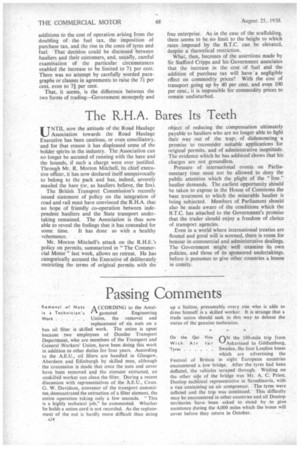The R.H.A. Bares Its Teeth
Page 26

If you've noticed an error in this article please click here to report it so we can fix it.
UUNITIL now the attitude of the Road Haulage Association towards the Road Haulage Executive has been cautious, or even conciliatory, and for that reason it has displeased some of the bolder spirits in the industry. The Association can no longer be accused of running with the hare and the hounds, if such a charge were ever justified. Through Mr. R. Morton Mitchell, its chief executive officer, it has now declared itself unequivocally to belong to the pack and has, indeed, severely mauled the hare (or, as hauliers believe, the fox).
The British Transport Commission's recently issued statement of policy on the integration of road and rail must have convinced the R.H.A. that no hope of friendly co-operation between independent hauliers and the State transport undertaking remained. The Association is thus now able to reveal the feelings that it has concealed for some time. It has done so with a healthy vehemence.
Mr. Morton Mitchell's attack on the R.H.E.'s policy on permits, summarized in "The Commercial Motor" last week, allows no retreat. He has categorically accused the Executive of deliberately• restricting the terms of original permits with the object of reducing the compensation ultimately payable to hauliers who are no longer able to fight their way out of the trap; of dishonouring a promise to reconsider suitable applications for original permits, and of administrative ineptitude. The evidence which he has adduced shows that his charges are not groundless.
Pressure of international events on Parliamentary time must not be allowed to deny the public attention which the plight of the " free " haulier demands. The earliest opportunity should be taken to expose in the House of Commons the base treatment to which the miserable haulier is being subjected. Members of Parliament should also be made aware of the conditions which the B.T.C. has attached to the Government's promise that the trader should enjoy a freedom of choice of transport agencies.
Even in a world where international treaties are flouted and good will is scorned, there is room for honour in commercial and administrative dealings. The Government might well examine its own policies, and those of its sponsored undertakings, before it presumes to give other countries a lesson in comity.












































































